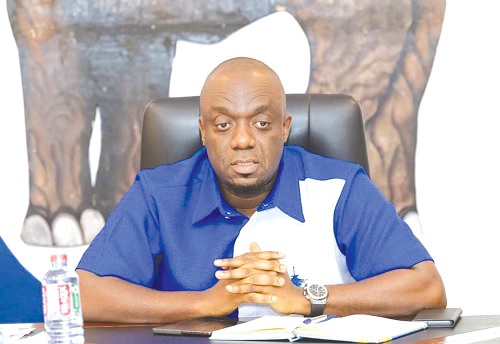
Is NPP losing academics? - John Osae-Kwapong writes
The New Patriotic Party’s (NPP) relationship with academics and the long-held perception as the party of intellectuals came under sharp focus last week.
The former General Secretary of the party, Mr John Boadu, is reported to have said in a recent interview that the party was losing support among academics.
This was an intriguing statement because the NPP has long been described as the party of intellectuals and the natural home of academics.
I reflect on this from two angles.
First, my observations on the relationship between the party and academics pre- and post the 2016 election.
Second, my observations from the Afrobarometer survey on how educational attainment shapes party affiliation.
NPP and academics
I can't speak for all academics, but my general observation is that the relationship between these two groups was very cordial in the lead-up to the 2016 election.
Known voices within the academic community highlighted the governance challenges facing the country during the first John Mahama presidency.
The Facebook pages of these academics were very active and served as platforms for engaging with matters confronting the nation.
Their thoughts and analysis were well received.
It is not far from the truth to say that many NPP partisans and academics appeared to be in sync, agreeing that the John Mahama administration was not delivering.
Then came the NPP's victory, and as the years passed, in my opinion, the relationship began to change.
Academics I have spoken to will say the very yardstick of good governance that drove their work in the past and was embraced by many of their NPP friends is now being met with hostility.
My good friends in the NPP, with whom I have spoken, argue that academics engage only in criticism and, even when wrong, are never willing to admit it.
By 2024, in my opinion, the relationship had not only deteriorated but broken down.
And because some of these faces and voices were part of the civil society community, that relationship also suffered.
A recent appointment of one of the academics and the reaction of some NPP partisans only reflect the current state of this relationship.
And so, when the former general secretary sounds the alarm that the party is losing this group, it's an observation worth a moment of reflection.
In the aftermath of their 2024 defeat, I spoke privately with some friends in the NPP.
I suggested that part of its post-election efforts should be devoted to repairing this broken relationship. As to whether that will happen, only time will tell.
Party affiliations
A broader issue resulting from this current conversation is the relationship between educational attainment and party affiliation.
The question is: how are the National Democratic Congress (NDC) and the NPP faring with this demographic group?
The Afrobarometer survey regularly asks about party affiliation. For those who say they feel close to a party, the follow-up question is to identify the specific party.
I disaggregate the responses into five categories of educational attainment: a) no formal schooling; b) some primary education; c) primary education completed (including those with some secondary education but not completed); d) secondary education completed; and e) post-secondary education (including post-secondary, some university, university completed, and postgraduate).
A special note on the post-secondary combinations.
The numbers for each subgroup are too small to allow meaningful disaggregation.
The data is available for these survey years: 1999, 2005, 2008, 2012, 2014, 2017, 2019, 2022, and 2024.
There are three main observations from analysing the data.
First, those who say they have “some primary education” across all the years with available data feel closer to the NPP than the NDC.
However, in 1999, the gap was 63 per cent - 35 per cent, but in 2024, it was 51 per cent - 49 per cent.
Second, the NPP and NDC have battled for those with “no formal education”.
Here is how this group’s party affiliation has changed over time: 1999 (NDC); 2005, 2008 (NPP); 2012, 2014 (NDC); 2017 (NPP); and 2019, 2022, 2024 (NDC).
Third, among those who have completed primary, secondary, and post-secondary education, the NDC is their party of choice most recently (2024), after the NPP captured them over the years (2005, 2008, 2012, 2014, 2017, 2019, 2022).
The NDC leads the NPP by the following margins: a) primary education (+6); b) secondary education (+2); and c) post-secondary (+1)
Conclusions
Party affiliation by educational attainment has shifted. Whether this shift will be permanent remains to be seen.
When you hear NDC partisans say they've become an attractive political party, don't brush it off.
When you probe the Afrobarometer data beyond just educational attainment, there are clear signs of demographic groups shifting from the NPP to the NDC, or of gaps narrowing, as of the most recent survey year (2024).
The writer is the Project Director, Democracy Project.
